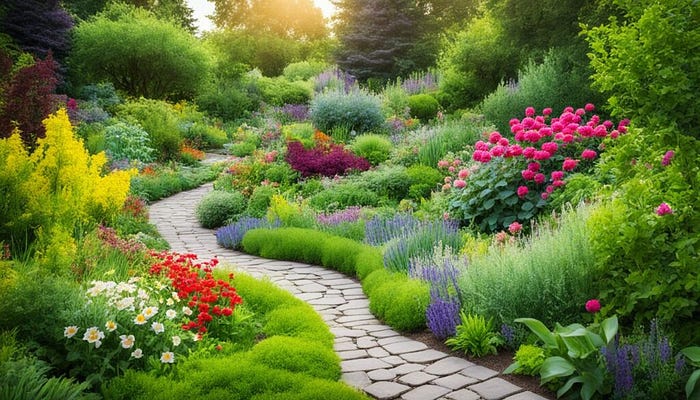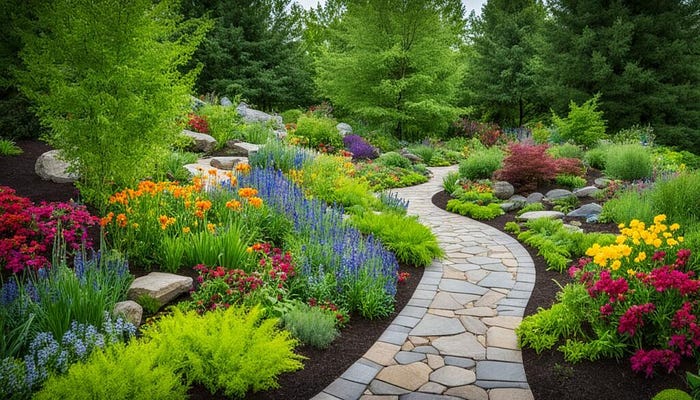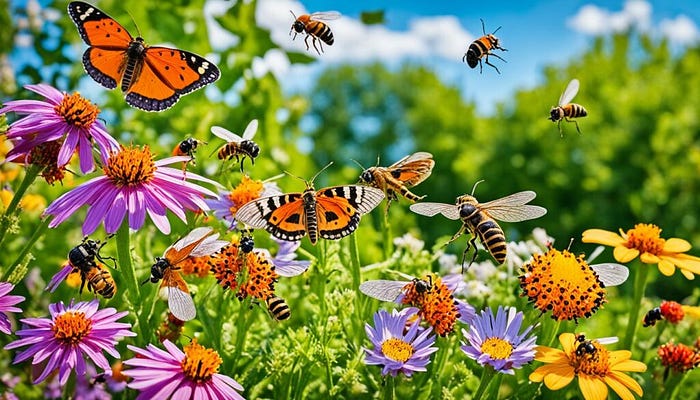10 Garden Trends 2024: Embrace Resilient and Creative Gardening
In 2024, the gardening world is looking at new challenges. A focus on resilience and creativity is now key. This year, top trends are all about tackling climate change, using sustainable methods, and making beautiful yet functional outdoor areas. But which trends should you watch out for, and how can you bring them into your garden?
Enhancing Gardens with Edimentals
In 2024, garden lovers take special note of sediments. These are plants that look good and taste good too. They turn ordinary gardens into places that burst with life and flavour.
What Are Edimentals?
Elementals serve two purposes — they are beautiful and they are yummy. Think of colourful Swiss chard and delicate nasturtium flowers. They make gardens joys for the eyes and the stomach. Now, you can fill your garden with plants that not only look good but also provide food.
Incorporating Beauty and Flavor into Every Corner
Planting elementals can make gardens stunning and productive. They need less care than veggies and give fruits all year. Plus, their deep roots help them survive tough conditions. This encourages kids to play and find food in the garden. Elementals help gardeners design beautiful spaces that feed both the body and spirit.
“Edimentals offer the best of both worlds — the visual appeal of ornamental plants and the practical benefits of edible crops. They’re a game-changer for modern gardeners who want to maximize the potential of their outdoor spaces.” — Jane Doe, Horticulturist
With the rise of interest in easy, productive gardens, sediments are set to shine in 2024 and after. These plants help gardeners grow lively, enduring, and fruitful spaces. They delight the eyes and the taste buds.
Exploring the New Perennial Movement
The gardening world is turning to a nature-inspired approach. The New Perennial Movement is at the core of this shift. It started in the Netherlands and focuses on creating gardens that mirror wild ecosystems.
Unlike perfectly trimmed lawns, these gardens are more relaxed. They are filled with plants that need little looking after.
Embracing Wild Beauty Inspired by Nature
This movement loves the wild look of natural plants. It lets them grow freely together, creating a unique, unstructured beauty. This style uses perennials that look great all year and help the environment.
By letting the plants reseed naturally, maintenance is easy. Plus, it attracts helpful pollinators, keeping the garden in balance with nature.
Why Naturalistic Planting?
Naturalistic gardens are not just pretty; they offer many perks. They’re easy to care for, needing less water and chemicals. By focusing on perennials and native plants, the soil stays healthy. And it creates homes for wildlife.
This approach to gardening fits with the trend of being eco-friendly. It’s all about living in harmony with nature.

The New Perennial Movement is changing how we see garden design. It encourages mixing local and exotic plants for a beautiful, wild effect. This mix is not only stunning but also easy to maintain. It’s why more gardeners are choosing this style.
“The New Perennial Movement allows gardeners to embrace the wild beauty of nature, fostering a sense of harmony and balance in their outdoor spaces.”
Preserving Every Drop with Rain Gardens
As droughts become more common, the use of rain gardens is increasing. These beautiful features help save water and manage stormwater. Rain Gardens catch, soak, and clean stormwater from hard surfaces like roads and roofs. This lessens the harm of urban growth on local waterways.
Rain gardens slow down rainwater, letting it soak into the ground on-site. They are built to distribute water evenly with slopes and gentle dips. This stops soil from washing away. Using plants that naturally grow there helps with soaking up water. Also, putting down mulch keeps the water in and helps stop weeds from growing.
Rain gardens offer more than just saving water. They cut down on flood risk by making the water flow slower. These gardens also clean the water by taking out dirt and harmful stuff, which is good for the local water places. By using local plants, rain gardens bring in all sorts of animals and plants.
Adding a rain garden to your yard is a great move for the environment. It helps manage water well and makes your garden stronger against problems. Rain gardens are key for saving water in dry areas. They fit well with smart gardening for water conservation. Homeowners can pick the best plants for their area by looking at the soil, sunlight, and what’s allowed locally. This helps make the garden look good and saves water.
Sustainable Water Management for Beautiful Landscapes
Rain gardens not only look nice but also help with water issues. They cut down on water that flows quickly and the risk of landslides. They also clean the water. By using rainwater right where it falls, these gardens save this valuable resource.
Choosing the right native plants is key to a good rain garden. Experts and gardening groups can help with this choice. Places like the Virginia Cooperative Extension’s Master Gardeners give advice and support to homeowners. They help make and look after rain gardens.

Homeowners who add rain gardens to their places not only save water but also make nicer and more eco-friendly spots outside. Rain gardens fit well into clever gardening for saving water. They are great for managing water resources.
Learning to Love Bugs
In gardens today, people are looking at bugs differently. They are focusing on making gardens friendlier to bugs and managing pests in ways that care for the environment. This new view means gardeners are more willing to welcome some insects that help their plants. They see it as part of gardening that values all life and tries to create a natural balance.
A Shift Towards Sustainable Pest Management
Gardeners are now turning to organic pest control. They are learning to spotless harmful bugs and are welcoming those that help, like pollinators. Rather than using strong chemicals, they’re using eco-friendly methods. This change is all about understanding the important roles insects have in making gardens better places for plants, people, and animals to thrive.

This move towards bug-friendly gardening is good for everyone. By supporting a rich variety of life in their gardens, gardeners can cut down on using harmful pesticides. Their gardens also become full of life and look great, making both nature and the gardener happy.
Conclusion
In the upcoming year, gardening trends will show how dedicated the community is. They will deal with changes in the world creatively and with strength. People will start growing edible ornamental plants and use more wild-looking gardens. They will also save water with rain gardens and welcome helpful insects. This all shows a complete way of caring for the environment while staying flexible.



Comments
Post a Comment